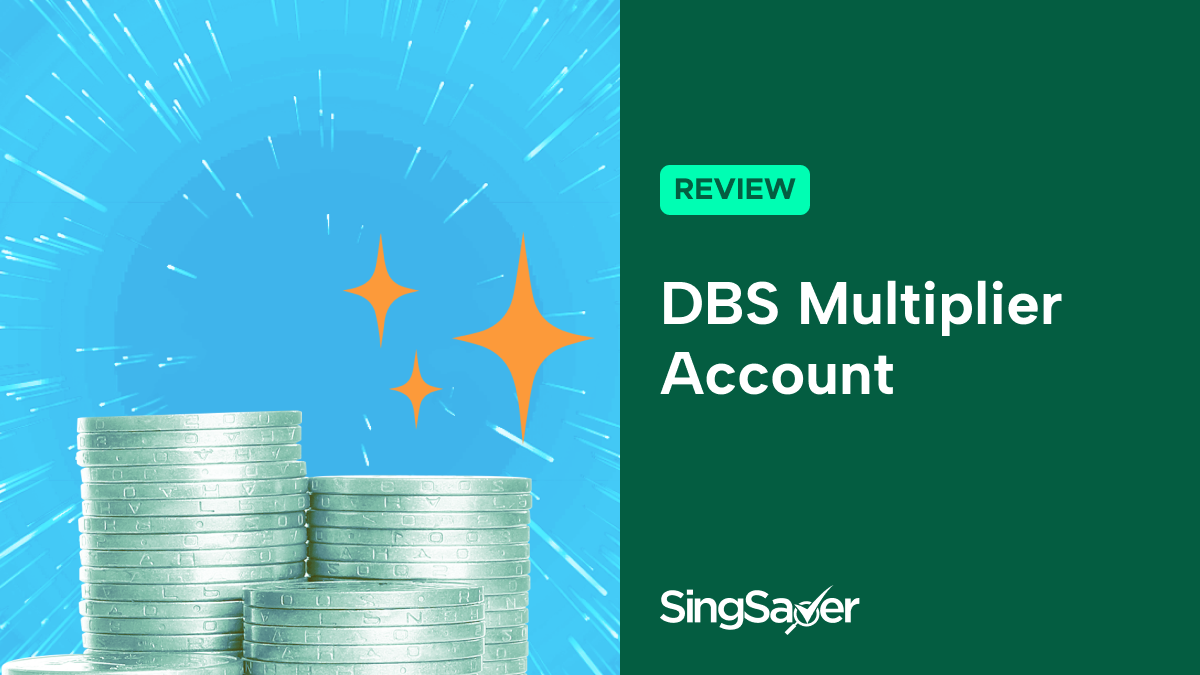The DBS Multiplier Account has simplified its interest tier, making it easier for you to earn higher interest than before.
Interest rates have risen in the face of continued high inflation. While this exerts economic pressure by making credit more expensive, there’s also one silver lining for diligent savers. Bank savings account interest rates have also increased, making saving more rewarding.
One good example is the DBS Multiplier Account, which lets you earn an interest of up to 4.10% p.a on your bank deposits. Moreover, it has also made some notable revisions on 1 August 2023, making it simpler for you to earn bonus interest.
Let's take a look at this savings account works and how you can maximise the interest earned.
Table of contents
- How the DBS Multiplier Account works
- How the DBS Multiplier Account benefits joint account holders
- Types of joint accounts
- How couples can multiply their earnings with the DBS Multiplier Account
- How to open a DBS Multiplier join account
- Conclusion
How the DBS Multiplier Account works
As shown above, besides salary crediting, depositors are required to make transactions in at least one of four other categories to earn bonus interest.
How much bonus interest you earn is impacted by three criteria:
- the total eligible transactions per month
- the current balance in your account
- how many categories you transact in
The first criterion, total eligible transactions per month, is split into three levels, which earn different levels of bonus interest, as follows:
- Total monthly transactions from S$500 to S$15,000 = 1.80% to 2.40% interest p.a.
- Total monthly transactions of S$15,000 to S$30,000 = 1.90% to 2.50% interest p.a.
- Total monthly transactions of S$30,000 or more = 2.20% to 4.10% interest p.a.
Next, having a higher total balance will also increase your bonus interest. Up to your first S$50,000, you can earn bonus interest between 1.8% to 2.2% per annum. And up to your first S$100,000, you can earn between 2.1% to 4.1% bonus interest per annum.
Lastly, transacting in more categories will also increase your bonus interest earned, as follows:
- Income + 1 category = 1.8% to 2.2% interest per annum
- Income + 2 categories = 2.1% to 3.0% interest per annum
- Income + 3 categories = 2.4% to 4.1% interest per annum
In short, the more you save and bank with DBS, the higher your bonus interest.
Read also: Best Savings Accounts in Singapore to Park Your Money
What if you don’t have an income to credit?
Even those who are not able to credit their incomes can earn bonus interest, based on the total eligible transactions made on the other four banking categories, which include:
- Credit card or PayLah! Retail spends
- Home loans
- Insurance premiums
- Investments
Without income crediting, all other eligible transactions will earn you a 1.50% bonus interest on the first S$50,000 of your total balance. This applies as long as you’re 29 and below.
Additionally, what counts as “income” isn’t restricted to regular salaries. Annuities such as CPF Life payouts, allowance from National Service, earnings from gig work and dividends from investments also count.
As such, anyone from retirees to National Servicemen, part-time or commissioned workers and even students can enjoy accelerated savings.
Back to top
DBS/POSB Credit Card Welcome Gift: Receive up to S$388 cashback or 85,000 miles when you apply for select DBS credit cards and fulfil the relevant promotion criteria. T&Cs apply.
How the DBS Multiplier Account benefits joint account holders
Joint account holders or couples who spend on different transactions can also mutually benefit from the DBS Multiplier Account. For example, if you primarily use PayLah!, while your spouse likes tapping their DBS credit card, both of you can enjoy bonus interest generated from each other’s expenses.
How do you do that? By setting up a joint account with individual DBS Multiplier Account for each of you.
Don’t worry, it’s much simpler than it sounds. We’ll walk you through it, but first let's understand how joint accounts work.
Read also: Should You and Your S.O. Get A Couple’s Credit Card?
Types of joint accounts
Joint accounts are a type of bank savings account which is shared by two people. That means that there are two account holders named in the account, and both have access to the funds within.
There are many advantages to having a joint account. For one, it makes it more convenient to meet family expenses, without having to make multiple transfers to and fro. For another, it’s also a convenient and transparent way to save towards joint goals, such as a dream holiday or a home downpayment.
Generally, joint accounts come in two configurations.
Joint-all account
Joint-all accounts (aka “joint accounts”) allow both account holders to make deposits at any time. However, withdrawals can only be made with the approval of both account holders.
Because of its more stringent requirement, a joint-all account is more catered to long-term saving goals where frequent withdrawals are not expected.
Joint-alternate account
On the other hand, joint-alternate accounts have a more flexible structure. Either account holder can make withdrawals without needing the approval of the other. Deposits may be made by either account holder at any time.
Joint-alternate accounts are more suited to needs such as family expenses, where frequent withdrawals are required. However, do be aware that such accounts can be completely cleaned out by a dishonest partner, so do be careful who you set up such accounts with.
Back to top
How couples can multiply their earnings with a DBS Multiplier joint account
Now that you’re aware of the different types of joint accounts, and their benefits and potential drawbacks, let’s take a closer look at how you and your loved one can join forces to earn bonus interest.
Joint account + DBS Multiplier Account – how does it work?
Here’s the secret sauce: when two account holders make deposits or credit salaries, and carry out any eligible transaction, both will earn bonus interest based on the combined value of all eligible transactions.
Consider the following example:
|
John |
Mary |
|
|
Salary crediting |
S$4,000 |
S$4,500 |
|
Credit card or PayLah! spends |
S$2,000 |
S$1,200 |
|
Investment |
S$500 |
S$0 |
|
Insurance |
S$0 |
S$0 |
|
Mortgage |
S$800 |
S$700 |
|
Total combined value |
S$7,300 |
S$6,400 |
John’s total eligible transaction of S$7,300, while his wife, Mary’s, is S$6,400.
Here’s how much interest they would earn – separately, and with a joint account.
|
John (salary + 3 categories) |
Mary (salary + 2 categories) |
|
|
Individual accounts |
2.4% p.a. on S$7,300 |
2.1% p.a. on S$6,400 |
|
Joint account |
2.4% on S$13,700 (S$7,300 + S$6,400) |
2.1% on S$13,700 (S$7,300 + S$6,400) |
As you can see, both John and Mary earn interest on S$13,700 (the combined total of their transactions), instead of just their own transactions, allowing both to grow their individual Multiplier accounts quicker. Plus, this works even if only one party is crediting a salary, so single-income households can also benefit!
How to open a DBS Multiplier joint account
To earn higher bonus interest together, couples will first need to set up the proper accounts. Here are the steps you need to follow:
Step 1: Open both DBS Multiplier accounts individually
Both of you will need to first have individual DBS Multiplier accounts. You may apply for a new DBS Multiplier Account as a new customer, or request for your existing DBS Autosave or the DBS Multi Currency Account to be converted to a Multiplier account.
Step 2: Apply for joint account
Once both of you are in possession of a DBS Multiplier Account, apply for a joint-alternate My Account. You can open an account online, no bank branch visits needed.
Step 3: Credit salary into joint account
Afterwards, arrange for your salary to be credited to your newly opened joint account. As explained earlier, you only need one party to credit their salary, although combining both salaries will help you qualify for higher bonus interest.
Step 4: Credit your dividends into joint account
If you have any active investments that pay dividends, be sure to credit them into your joint account too. Doing so will increase your total eligible transactions for bonus interest.
Step 5: Transfer money to your DBS Multiplier Account
Don’t forget that you can access a higher tier of bonus interest if your account balance crosses the S$50,000 threshold, so if you have spare cash, consider topping up your DBS Multiplier Account to help you earn higher bonus interest faster.
The bottom line
Combining a joint account with the DBS Multiplier Account is, quite frankly, a genius way to effortlessly earn higher interest. You and your partner can benefit from each other’s expenses, while also building trust and reliance as you pursue common savings goals.
So if you’re warming up to take the next step with a beloved someone, why not set the stage with a joint account first? The bonus interest you’ll help each other earn is a nice way to pledge your support and commitment to each other.
DBS/POSB Credit Card Welcome Gift: Receive up to S$388 cashback or 85,000 miles when you apply for select DBS credit cards and fulfil the relevant promotion criteria. T&Cs apply.
Read these next:
11 Ways To Prepare Yourself For A Recession During COVID-19
Loyal DBS/POSB Customers: Which Credit Card Should You Add To Your Wallet?
DBS/POSB Credit Card Promotions and Deals
5 Ways to Cope With Financial Setbacks Hitting Singaporeans Hard Amid COVID-19
Considering a Career Switch? Here Are 4 In-Demand Jobs In The COVID-19 ‘New Norm’
Similar articles
Best Credit Cards To Power Up Interest Rate On Your Savings Account (2020)
HSBC Advance Review: The Bank Account That Grows With You
Guide To Opening A CDP Account And Tips On How To Use It
CIMB FastSaver Account Review (2024): Features, Minimum Balance & More
Another One Bites The Dust: Major Savings Accounts Further Slash Interest Rates For 2021
7 Good Reasons to Change Your Savings Account
POSB Save As You Earn (SAYE) Review 2020: Breeze Your Way To 2% Interest On Your Hard Earned Savings
4 Reasons Why DBS Multiplier Is A Competitive Savings Account










